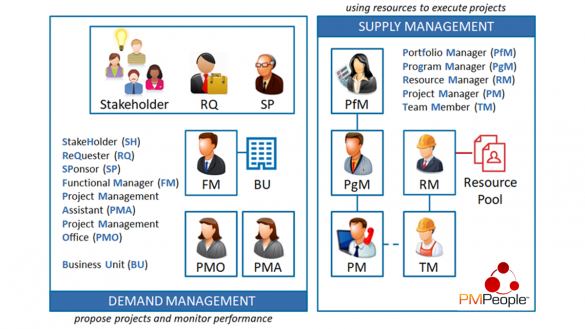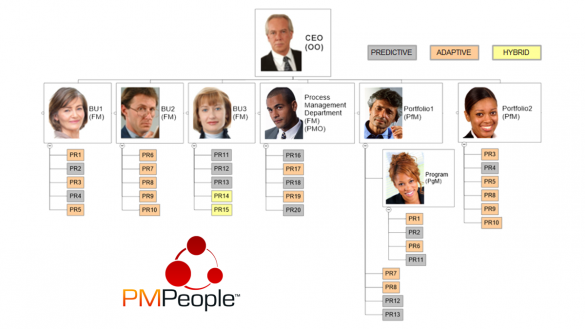Individuals and Interactions over Processes and Tools (in Projects)
Process-driven project management has been effective until the 21th century. However, today’s projects require people collaboration for many compelling reasons: 1) Requirements are usually not clear enough, and project scope has to be progressively elaborated; 2) Controlling changes, time and cost is less important than value delivery and meeting the business goals; 3) Managers need to make informed real-time decisions, anticipating issues while there are still options to correct project performance, and they don’t have time to read comprehensive documentation from dozens or hundreds of projects; 4) Just one person to manage the whole project is not effective: collaboration is needed because the best solutions may come from one of many stakeholders.
Companies are getting “Projectified”
If you run a company selling products or services to your clients, you have to “run the business” (operations management) and “change the business” (project management). Globalization has made companies equally proficient at operations management. Project management can make a difference in beating the competition, expanding into new markets, innovating, growing, etc. Poor project management can hurt companies (Bard case). Excellent project management can boost the stock market value (Microsoft). Top managers do not need to be experts in project management. They can organize projects into Business Units, Programs, and Portfolios and, most importantly, they can trust professionals.
I’m a Project Manager. What’s your job?
Will the Project Manager job end up being a profession recognized by society? If we tell people that we are project managers, will they understand this is a profession like a cook, an accountant, a lawyer, a dentist, etc.? Over 50 years ago, experts agreed a new discipline was needed to turn ideas into reality. Operations management was good to manage the day-to-day business, not to manage the creation of new products, services or results, or any kind of organizational change. Companies beat their competitors thanks to projects: they launch new products or services, open new markets, execute the strategic plan, etc. A project manager is more than just an efficient person who controls the tasks of the project team members.
Project Manager is a Profession
Project Management is a profession with a great future, but it must adapt to our times. Stakeholders expect the project to meet the business goals and deliver value. They don’t want us adding bureaucracy, wasting our time on paperwork, or even worse, wasting their time or team members time in meetings we should avoid. They need to know how the project is doing real time, just by getting evidence on 8 performance domains. Above all, they want the project to be predictable and to avoid crisis.
Controlling Projects Performance
Project managers use their soft skills to manage any project professionally, but they need also their hard skills, some of them highly automatable. PMPeople automates many techniques to control the project performance, such as decomposition, schedule control, earned value management, etc.
Categories
- Business (16)
- Demand Management Roles (14)
- Frequently Asked Questions (7)
- Guide (26)
- People (23)
- Assignments (2)
- Feedback (2)
- Project Team (3)
- Tracking Time And Expenses (2)
- Process (9)
- Closing (2)
- Executing And Controlling (2)
- Planning (1)
- Project Management (67)
- Management Frameworks (18)
- Organization Owner (OO) (3)
- Project Economy (54)
- Tools (19)
- Supply Management Roles (5)
- Training (6)
- Uncategorized (1)







